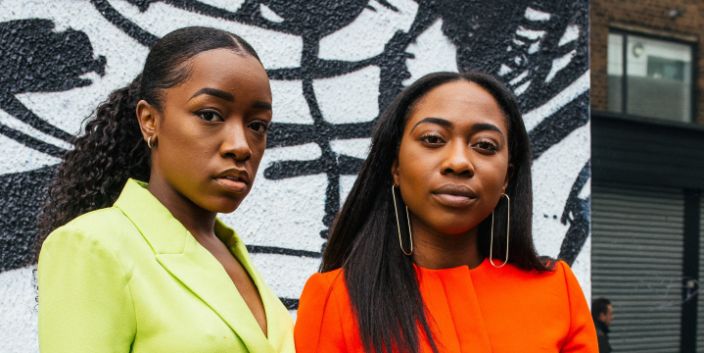Going to university is an adjustment for any student. Attempting to find new friends, juggling seminars with socials, and trying to make a strange city your home. But for Chelsea Kwakye and Ore Ogunbiyi that challenge was even greater, when they found themselves as two of a handful of black students at a predominantly white institution: Cambridge University.
In 2017, only 9.1% of those admitted t0 Cambridge university identified as black or mixed black – something which Ore knows well. “In my college year, there were three girls who were black, and two guys who were mixed black,” she tells Cosmopolitan UK, while Chelsea adds “a boy once said I was the first black girl he’d ever spoken to – I couldn’t even begin to imagine the preconceptions he had.”
Settling in
Ore, who studied Human, Social and Political Sciences, and Chelsea, who studied History, graduated from Cambridge in June 2018, releasing their book under Stormzy’s #Merky Books imprint little over a year later. Taking Up Space: The Black Girl’s Manifesto For Change details their experience of institutionalised racism, as well as everyday life as a black woman at Cambridge – starting with freshers’ week.
“I would go out to clubs where I didn’t like the music and hang out in the smoking area even though I don’t smoke,” Ore comments. “I was trying to make friends with people who were very unlike me, all while suffering from huge imposter syndrome.” Chelsea experienced something similar, adding “I was lead to question; am I just here because I’m ticking a diversity box? Am I actually good enough?”
Ore detailed this ordeal in a 2017 essay, A Letter To My Fresher Self: Surviving Cambridge As A Black Girl. In it, she tells of how she changed her accent, went to events she didn’t enjoy and attempted to conform to Cambridge expectations, because she felt a pressure to be anyone but herself.
“I often felt like the black subject of intrigue,” she elaborates. “I was the only black girl in my halls, so if I was cooking plantain in the kitchen, other students would be like, ‘Oooh, what’s that?’ Or if I came back to university with new braids, I would face a barrage of questions. People would want to smell my hair, or touch it.”
Ore knew at the time that this behaviour wasn’t right, but “I didn’t want to say anything because it was like, ‘How am I going to make friends with these people?’ I know asking me weird questions about my food isn’t OK, or touching my hair, but I couldn’t say anything because that was the reality of being at Cambridge.”
It wasn’t until she made friends with other black students at Cambridge that she began to settle in. “I found a safe space, basically – people who actually understood my position. I made a Whatsapp group for me, Chelsea and two other black friends, and the pressure to ‘fit in’ subsided.”
Socialising
Ore and Chelsea found solace in Cambridge’s African and Caribbean Society, where they formed solid friendships that they still hold today. But beyond friendship came dating – something that was even more nuanced than making mates. “As a black woman dating at Cambridge University, it felt like I had limited options,” Ore explains. “I was very conscious of whether I was being fetishised, or if somebody was trying to fulfil their ’black girl fantasy’.
“Pair that with that fact I’m intelligent and a woman, I was fighting against this stereotype of coming across as intimidating. It felt like ‘if I’m too independent, they won’t like me’ or ‘If I’m too successful, they won’t want to date me’. You’re made to feel like you’re too much for people – it plays into the unbearable stereotype of being an ‘angry black woman’.”
Beyond dating, Ore also found the clubbing culture of university complex. “Going out out is generally just a bit difficult if you’re a black woman,” she says. “When you arrive at uni, you have all sorts of expectations of how a club works. But as a black woman, it’s different. It was rare for a guy to ask if he could buy me a drink – it got to the stage where I realised the chances of me finding a boyfriend in a club were highly unlikely.
“But the conversation wasn’t ‘Oh my God, boys don’t like me’ – it was more about how society constructs this scale of desirability, that black girls are at the bottom of. It felt like I wasn’t even a consideration. Also, for many Cambridge students, I was probably one of the first black people they’d ever spoken to. Can you even begin to imagine the misconceptions and perceived ideas they had about me?”
Studying
Of course, university isn’t just socialising and dating. It’s studying, too – something Ore and Chelsea says comes with its own challenges. “The curriculum is very narrow in its subject matter,” Ore comments, highlighting her reading list’s lack of diversity. Chelsea elaborates: “It wasn’t until my final year, where I did a paper on consumerism in Africa, that I was able to include black women and trans people as sources, and actually explore a diverse range of views. It was the year I did best.”
Neither student were taught by a black lecturer, something with Chelsea and Ore put down to systematic failure rather than the fault of their university – only 2.5% of teachers in England identified as black or mixed black in 2018. So, what needs to change? “It’s about social mobility for black people, and access to university in the first place,” Chelsea concludes.
“We have to start with the national curriculum from lower key stages, and make sure the academics we hire have a diverse range of interests. We have to deconstruct what diversity actually looks like – and we have to listen to the people that it impacts the most. We need to invest in research, culture and social mobility.”
Encouraging diversity at university isn’t just about awareness, percentages and acceptance letters – it’s about equal opportunity from the very beginning. “Underrepresentation reproduces underrepresentation – in order to break the glass ceiling, you have to make it a level playing field from day one,” Chelsea adds. “It will take time and effort. But most of all, it takes listening to – and validating – our experiences as black women who have gone through it. Hear what we have to say, and take action to improve the experience for the next students like us.”














